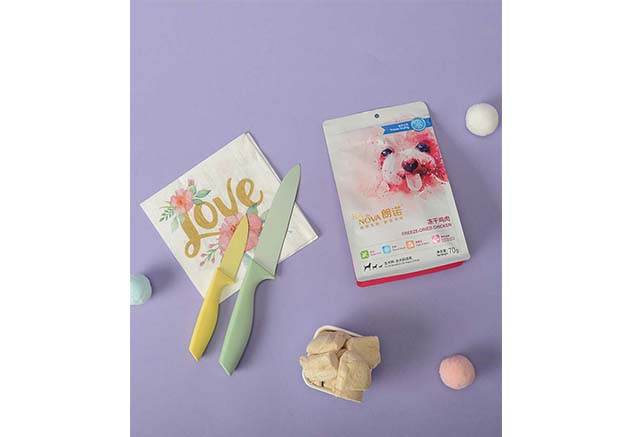We've all heard that dogs shouldn't eat table scraps. Due to the coronavirus pandemic, many dog owners in many supermarkets are facing a shortage of dog food and may be inclined to share food with them. If you want to know which foods can be shared with dogs and which foods should be avoided, check the following list:
Sweet potatoes (cooked): Sweet potatoes are a healthy vegetable choice. Cook it first to make it easier to digest. Discard the peels of non-organic sweet potatoes, as most peels are sprayed with anti-mold fungicides.
Pumpkin: Canned pumpkin is convenient and nutritious. However, cooked fresh pumpkins and other pumpkins are the best choices.
Pea: Fresh or freeze dried pea is a great way to add beneficial nutrients to a dog's diet. In addition to green beans, snow peas and snow peas are also a healthy snack.
Organ meat (some): The liver and heart of a chicken, turkey, and beef are healthy sources of vitamins and minerals for dogs. Freeze dried Chicken powder is rich in cartilage and is an important part of a healthy pet diet.
Egg: Eggs provide your dog with an excellent source of protein and essential omega-3 fatty acids. Dogs can eat raw or slightly boiled eggs. For optimal nutrition, please consume organic pastured eggs.
Haricot vert: Mung beans are a nutritious vegetable for your dog. Before feeding your pet, boil the green beans to make it easier to digest.
Fruits: Freeze dried pear, apples (without seeds), bananas, blueberries, cantaloupes can all be safely eaten with your dog, even though melons are high in sugar.

Popcorn: Popcorn is a regular snack in most households. Occasionally a few slices of organic popcorn will not hurt your dog. Air popcorn or popcorn with a little coconut oil are better snack options.
Sardines and other fish: Canned sardines filled with water (not oil or soy sauce) are the best fish for dogs for many reasons. Sardines are an important source of vitamin D: This small wild-caught fish is less likely to contain toxic heavy metals than other fish species. The bones of canned sardines are very soft, so there is no health risk. Other types of fish are harmless to dogs, but the preparation method may harm them. For example, fried fish can cause stomach upset and even pancreatitis. Fish containing an onion meal may be poisonous. However, the biggest risk of feeding dogs fish is bones. Therefore, please be extra careful.
Ice cream: Products containing milk can cause diarrhea and other digestive diseases in dogs, which can lead to food allergies (usually itching). Avoid adding artificial sweeteners and other additives to commercial ice cream, especially those that contain xylitol. For occasional snacks, please provide homemade frozen snacks or yogurt made with coconut milk or almond milk instead of milk. Sometimes non-dairy ice cream flavored with blueberries or other fruits can be used, but it never contains chocolate.
Citrus fruits: Freeze-dried pet food manufacturers believe that oranges, tangerines, and tangerines are non-toxic to dogs. However, they are high in sugar, and if your pet eats too much sugar, it may cause gastrointestinal discomfort. The citric acid in these fruits is not important to dogs.
Watermelon is safe for dogs, but the seeds must be removed first, and the only watermelon is the safest (no skin).
Grapes, cherries, and raisins: Since food-borne fungi produce toxic chemicals that can cause mycotoxins, grapes and raisins may cause organ damage to your dog. You don't have to see the mold on the grapes to be toxic.
onion: As we all know, onions can cause anemia in dogs. Do not feed onions to dogs or foods containing onions to avoid toxic effects. Not even part of the sandwich.
Poultry skin, neck, back, and wings: The chicken parts left over after cooking should not be fed to pets. The cooking process breaks down the bones, making the bones brittle and more likely to harm your dog when ingested. Fatty skin can cause gastrointestinal discomfort and even life-threatening inflammation of the pancreas. It is best to stick to some healthy white meat. High-fat content can also cause gastrointestinal discomfort and life-threatening inflammation.
Chocolate: Although chocolate maybe your favorite food, it may be harmful to your dog.
Dogs eating large amounts of chocolate can cause circulation and breathing difficulties or death. Always keep chocolate and foods containing chocolate (including biscuits and brownies) out of your pet's reach.
Bacon. Let's face it: Bacon is irresistible to anyone. But the health problems it brings are not worth the risk. Eating too much bacon food can cause pancreatitis in dogs. Bacon is usually high in salt, which may also cause other health problems for your dog.
Avocado: The pits, skin, and leaves of avocados contain persin. Persin is a toxin that often causes vomiting and diarrhea.
Macadamia: These nuts can cause vomiting, weakness, and depression. The good news is that the effect is not fatal. However, if ingested accidentally, be sure to contact your veterinarian.
